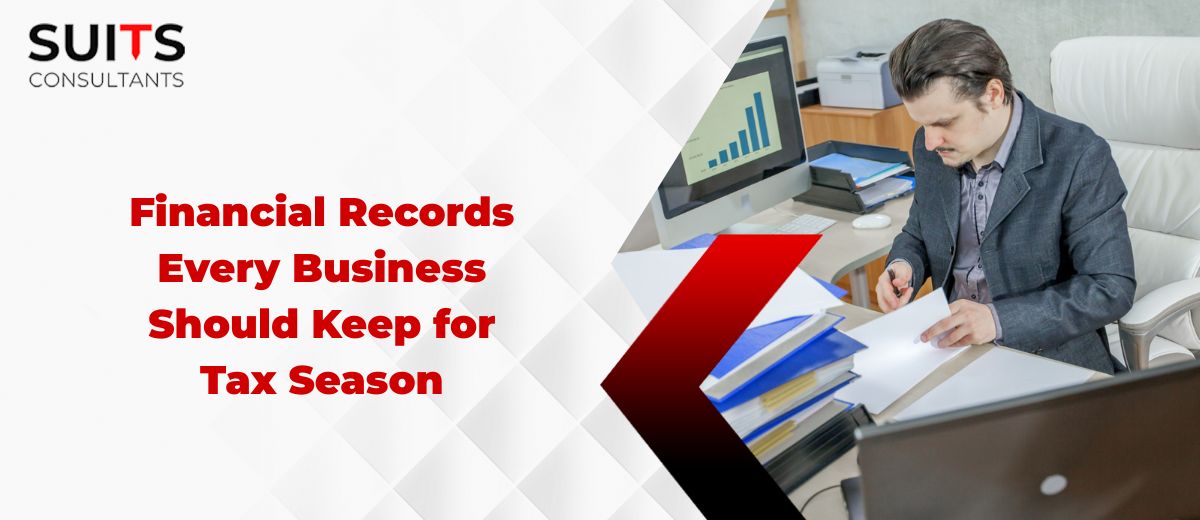Financial Records Every Business Should Keep for Tax Season
Tax season has a way of sneaking up on businesses. Some owners keep everything neatly in folders, others have a habit of tossing receipts into random drawers, hoping their accountant can piece things together later.
Whichever camp you fall into, there are certain financial records you can’t afford to ignore. Keeping them organized not only saves you from stress but can also protect your business if the tax office comes knocking.
Why Financial Records Matter
Taxes aren’t just about filing on time. The quality of your financial records can significantly impact how smoothly the process proceeds. They help you:
- Track expenses you might deduct
- Support the income figures you report
- Prepare for an audit without panic
- Understand where your business stands financially
Without these records, you’re essentially running blind, guessing instead of knowing.
Core Records You Should Keep
Income Records
At the top of the list are income records. These show the money flowing into your business. Examples include:
- Sales invoices
- Bank deposit slips
- Credit card transaction summaries
- Digital sales reports (if you sell online)
Even if payments move through multiple platforms, PayPal, Stripe, and direct transfers’s worth tracking each one. Missing even small deposits can create headaches later.
Expense Receipts
Receipts aren’t glamorous, but they’re gold during tax season. Keep:
- Vendor invoices
- Office supply purchases
- Utility bills
- Travel and mileage logs
Some receipts fade over time, so scanning them or using an app might be smarter than relying on paper slips.
Payroll Records
If you have employees, payroll records are non-negotiable. You’ll need:
- Employee details (W-2, W-4, etc.)
- Timesheets or salary agreements
- Tax withholdings and contributions
Even small mistakes in payroll reporting can trigger penalties, so this category deserves attention.
Bank and Credit Card Statements
Bank statements act like the backbone of your financial records. They tie income and expenses together. Keep both business bank account statements and credit card statements. Some owners make the mistake of mixing personal and business spending; sorting that out later is messy.
Tax Returns and Supporting Documents
Don’t just save this year’s return. Keep several years’ worth. In most cases, three to seven years of tax records are recommended. Supporting documents might include:
- Prior tax filings
- Notices from tax authorities
- Correspondence with your accountant
Extra Records That Help During Tax Season
Some businesses stop at the basics, but adding a few more categories can make tax time smoother:
- Asset purchase records: Equipment, vehicles, or property—these often qualify for depreciation deductions.
- Loan documents: Principal amounts, interest paid, and agreements.
- Inventory records: Especially if you sell products.
These might not come up daily, but when they’re missing, you’ll notice the gap.
How Long Should You Keep These Records?
There’s no single rule. Many experts suggest at least three years for most documents, since that’s the common audit window. But if you deal with assets, contracts, or long-term loans, holding on longer is wise. Think of recordkeeping as insurance; you may not need it, but when you do, you’ll be glad you kept it.
Practical Ways to Stay Organized
- Go digital where possible – Scanned copies are often acceptable.
- Use accounting software – QuickBooks, Xero, or even Excel if you’re disciplined.
- Set a monthly review – Waiting until year-end means sorting a mountain of paper in one go.
Even if your system feels imperfect, consistency matters more than perfection.
Conclusion
Keeping financial records isn’t just a tax obligation; it’s part of running a business with confidence. You don’t need the cleanest filing cabinet or the most expensive accounting software to stay on top of it. What matters is having a system that works for you and sticking to it.
Some records might sit untouched for years, others you’ll reference often, but all of them serve as a safety net. The effort may feel tedious now, but when tax season arrives, it’s the difference between scrambling and simply filing.
FAQs
Can digital copies replace paper records?
Yes, in most cases. Just make sure they’re clear and easy to access.
2. How many years of tax records should I keep?
Generally, three to seven years, depending on the type of record and your country’s tax laws.
3. Do small businesses need payroll records if they only hire freelancers?
For freelancers, you’ll need invoices and any tax forms related to contractors, not payroll records.
4. What happens if I lose a receipt?
You can sometimes use bank or credit card statements as proof, though it’s better to keep the original record if possible.
5. Is it okay to mix personal and business expenses in one account?
Technically, yes, but it makes tax season much harder. Separate accounts are always better.






